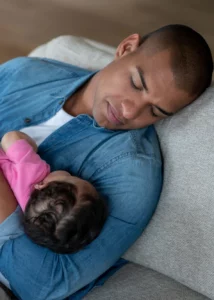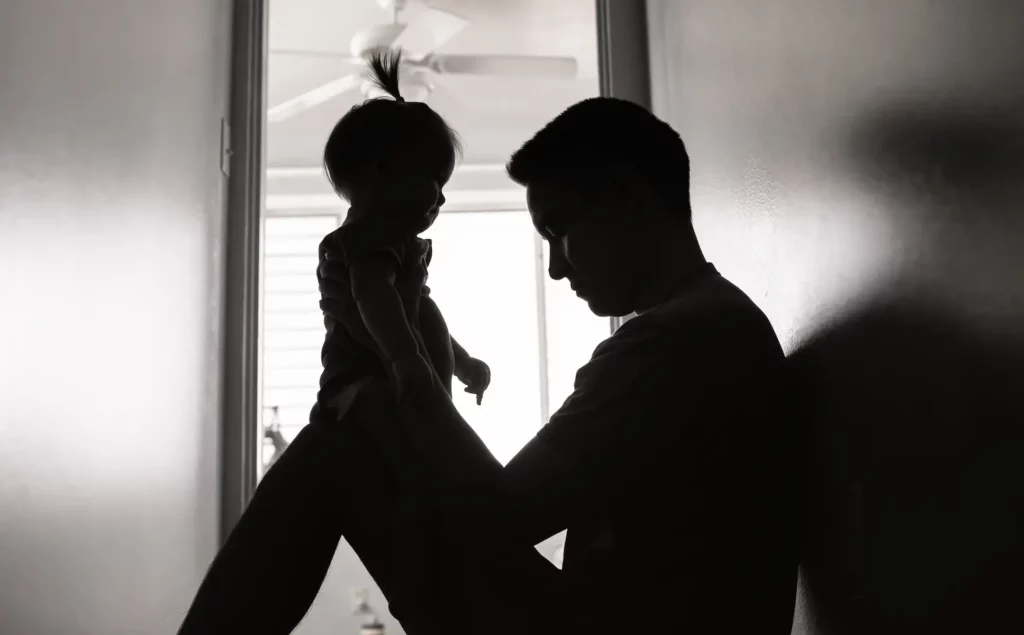We’ve all heard about postpartum depression in moms, but what about the dads? Well, let’s dive into something not everyone talks about – paternal postpartum depression. Now, don’t let the big words scare you. In this article, we’ll navigate the reality of paternal postpartum depression, exploring its signs, causes, impact, and the treatment options available.
So, if you’re a new dad feeling a bit off, or if you know someone going through this, it’s essential to recognize that it’s okay not to feel okay. We’re here to have an open conversation about what paternal PPD entails and, more importantly, how it can be addressed. Let’s get started!
Contents
Signs Of Paternal Postpartum Depression
 When it comes to postpartum depression, the conversation often revolves around mothers, focusing on hormonal changes and emotional adjustments. However, it’s crucial to recognize that fathers can also experience postpartum depression for different reasons. So, let’s explore some causes of paternal postpartum depression, considering the unique aspects that affect dads.
When it comes to postpartum depression, the conversation often revolves around mothers, focusing on hormonal changes and emotional adjustments. However, it’s crucial to recognize that fathers can also experience postpartum depression for different reasons. So, let’s explore some causes of paternal postpartum depression, considering the unique aspects that affect dads.
- Fathers, like mothers, may experience disruptions in their sleep patterns
- Fathers may face increased pressure to provide for the growing needs of the family, leading to stress and anxiety
- The shift from being an individual to a father can be significant and can cause anxiety and depression
- Sometimes, unrealistic expectations on fathers, expecting them to effortlessly transition into their new roles can lead to feelings of inadequacy.
- In some cases, the absence of sufficient paternal leave can limit a father’s ability to be actively involved in caregiving, potentially contributing to feelings of detachment.
- New fathers might experience a sense of isolation
- Fathers with a history of mental health issues may be more susceptible to postpartum depression.
- Fathers may neglect their own health during the transition to parenthood
- The unknown aspects of parenthood can be anxiety-inducing
- Fathers may feel pressure to provide emotional support to their partners while coping with their emotions
- Adjusting to a new lifestyle, including changes in routine and personal time, can be a source of stress for fathers
These signs highlight the multifaceted nature of paternal postpartum depression, if you resonate with any of the mentioned signs and feel it’s affecting your well-being, consider taking a Paternal Postpartum Depression (PPPD) test 👇👇
Paternal Postpartum Depression Test
Is Paternal Postpartum Depression Normal?
 When we talk about postpartum depression (PPD), the conversation often revolves around mothers, yet it’s crucial to acknowledge that fathers can also experience this challenging phenomenon. The question on many minds is, “Is Paternal Postpartum Depression in fathers normal?” Let’s delve into this inquiry to unveil the reality behind the experiences of new dads.
When we talk about postpartum depression (PPD), the conversation often revolves around mothers, yet it’s crucial to acknowledge that fathers can also experience this challenging phenomenon. The question on many minds is, “Is Paternal Postpartum Depression in fathers normal?” Let’s delve into this inquiry to unveil the reality behind the experiences of new dads.
- The arrival of a newborn is a life-altering event. It’s entirely normal for fathers to feel overwhelmed as they navigate the responsibilities and emotional adjustments that come with parenthood.
- Contrary to traditional expectations of stoicism in men, it is entirely normal for fathers to experience a range of emotions during the postpartum period.
- The impact of postpartum depression on daily life, relationships, and work is a shared reality for fathers. It’s normal for the challenges of parenthood to have repercussions on various aspects of a father’s life.
While experiencing postpartum depression is a common phenomenon, seeking professional guidance is crucial for fathers facing persistent and severe symptoms.
In conclusion, yes, paternal postpartum depression is a normal response to the complex and transformative journey of becoming a father. Understanding the normalcy of these experiences is a crucial step in fostering open conversations, eradicating stigma, and ensuring that fathers receive the support and understanding they deserve during this significant life transition.
The Effect of Ignoring Paternal Postpartum Depression (PPD) in Fathers
 Parenthood is often viewed through a lens of joy and celebration, but the unspoken challenges that fathers face, particularly with Paternal Postpartum Depression (PPPD), can have lasting effects when ignored. Let’s explore the profound impact of overlooking paternal postpartum depression, shedding light on the potential consequences for fathers, families, and society as a whole.
Parenthood is often viewed through a lens of joy and celebration, but the unspoken challenges that fathers face, particularly with Paternal Postpartum Depression (PPPD), can have lasting effects when ignored. Let’s explore the profound impact of overlooking paternal postpartum depression, shedding light on the potential consequences for fathers, families, and society as a whole.
- Strained Relationships
Ignoring the signs of paternal postpartum depression can strain relationships within the family unit. Fathers experiencing PPD may find it challenging to connect emotionally with their partners, leading to a breakdown in communication and intimacy. - Impact on Parenting Dynamics
PPPD can disrupt the natural flow of parenting dynamics. When left unaddressed, fathers may struggle to engage actively in caregiving, impacting the overall well-being and development of the child. - Escalation of Mental Health Challenges
Unchecked paternal postpartum depression can contribute to the escalation of mental health challenges. What may start as mild symptoms can intensify over time, affecting not only the father’s mental health but also his ability to function effectively in various aspects of life. - Financial Consequences
The financial implications of ignoring PPD in fathers cannot be overlooked. The strain on relationships and the potential inability of a father to perform optimally at work can result in financial stress, exacerbating the overall impact on the family’s well-being. - Impact on Children’s Development
Research suggests a correlation between paternal mental health and children’s development. Ignoring PPD may inadvertently hinder a child’s emotional and cognitive growth, as fathers struggling with untreated depression may find it challenging to provide the necessary emotional support and engagement. - Increased Risk of Family Breakdown
The strain caused by untreated PPD can contribute to an increased risk of family breakdown. The breakdown may manifest in the form of separation or divorce, further impacting the emotional well-being of all family members.
Ignoring paternal postpartum depression has far-reaching consequences that extend beyond the individual. Therefore, it is crucial to break the silence, foster open communication, and create a supportive environment where fathers feel empowered to seek help and address their mental health challenges.
Treatment Options for Paternal Postpartum Depression
Recognizing the importance of addressing Paternal Postpartum Depression, it’s crucial to explore the available treatment options that can aid fathers in coping with and overcoming this condition. Let’s delve into the various strategies and interventions designed to support fathers on their journey to mental well-being.
Therapy
 One effective treatment to navigate and overcome Paternal Postpartum Depression is through therapy. The therapeutic process provides a structured and supportive environment for fathers to explore, understand, and address the complex emotions associated with paternal PPD.
One effective treatment to navigate and overcome Paternal Postpartum Depression is through therapy. The therapeutic process provides a structured and supportive environment for fathers to explore, understand, and address the complex emotions associated with paternal PPD.
- Individual Counseling
Engaging in one-on-one counseling sessions with a mental health professional provides fathers with a secure space to explore their emotions, thoughts, and challenges. Through therapeutic dialogue, fathers gain valuable insights and coping mechanisms to navigate paternal PPD. - Couples Therapy
Incorporating partners into the therapeutic process can fortify relationships and enhance mutual understanding. Couples therapy specifically addresses the dynamics of parenthood, fostering open communication and collaboration in coping with postpartum depression.
Lifestyle Modifications

- Regular Exercise
Physical activity emerges as a powerful mood booster. Fathers coping with PPPD can benefit from incorporating regular exercise into their routine, whether it’s a brisk walk, a jog, or engaging in a preferred form of physical activity. - Healthy Sleep Patterns
Establishing healthy sleep patterns is crucial for mental well-being. Fathers should prioritize adequate sleep by creating a conducive sleep environment and discussing nighttime caregiving responsibilities with their partners. - Balanced Nutrition
Nutrition plays a vital role in mental health. Fathers can support their well-being by maintaining a balanced diet rich in nutrients. A well-nourished body contributes to improved mood and overall resilience.
Coping Strategies
- Mindfulness Practices
Mindfulness techniques, such as meditation and deep breathing exercises, can help fathers manage stress and stay present in the moment. Integrating mindfulness into daily routines fosters emotional resilience. - Stress Management Techniques
Learning stress management techniques equips fathers with practical tools to navigate the challenges of paternal PPD. These techniques may include time management, prioritization, and setting realistic expectations.
Medication Management
In some cases, mental health professionals may recommend medication as part of the treatment plan for paternal PPD. Antidepressants or anti-anxiety medications may be prescribed to alleviate symptoms and support emotional stability.
Support Systems
- Peer Support Groups
Joining peer support groups allows fathers to connect with others experiencing similar challenges. Sharing experiences, insights, and coping strategies in a supportive environment can be immensely beneficial. - Family and Friend Involvement
Involving close family members and friends creates a robust support system. Building a network of understanding individuals helps fathers feel less isolated and more supported in their journey.
Online Resources
Online resources, including mental health apps and digital platforms such as MantraCare, TherapyMantra and more, offer convenient access to therapeutic tools and information. These resources can complement traditional interventions and provide ongoing support.
In understanding the multifaceted nature of paternal postpartum depression, fathers can tailor their approach, combining different strategies to create a comprehensive and effective treatment plan for their unique circumstances.
Conclusion
As we navigate the complex terrain of Paternal Postpartum Depression, it’s clear that a multifaceted approach is crucial. From therapy and lifestyle modifications to coping strategies and support systems, fathers have an array of tools to craft a tailored path to well-being. Remember, addressing paternal PPD is a proactive step towards a healthier, more fulfilling family life.
Take Action for Your Mental Health! If you are experiencing depression-related issues, Online Depression Counseling at TherapyMantra can help: Book a trial Online therapy session. Prioritize your mental health and embark on a journey towards a brighter, more resilient future.


